#Alvin desmond
Explore tagged Tumblr posts
Text
Gaps Between Character Appearances: Flash vol. 1
Basically what it says on the tin: an examination of the longest amounts of time a character was absent for during the Silver/Bronze Age Flash run.
Heroes and Supporting Cast:
Barry Allen: Since he was the main character, Barry was, unsurprisingly, basically in every issue of the Flash. There are therefore no significant gaps in his appearances.
Iris West-Allen: Iris was in pretty much every issue from 1956 to 1979, when she was killed by the Reverse-Flash. She then disappeared from the comic until 1985, when she returned for the end of the Trial of the Flash arc---an absence of six years.
Henry and Nora Allen: Their biggest absence was a seven-year gap between 1966 and 1973. There was then a second large gap between their appearance in 1973 and their reappearance in 1978.
Daphne Dean: Her biggest gap was an 11-year disappearance from 1966 to 1977. She then had another large gap between 1977 and 1982.
Ira West: His biggest gap was a 3-year gap between 1975 and 1978. He then pretty much disappeared from the book entirely after 1979.
Solovar: His biggest absence was a 13-year gap between 1965 and 1978.
Wally West: As Kid Flash, he appeared pretty consistently, either with Barry or on his own, until the very end of the run. The biggest gap is a two-year span between 1981 and 1983.
Patty Spivot: She didn't have any gaps of more than a year at any point between 1977 and and 1984, her full run on the series.
Fiona Webb: Fiona didn't have any gaps of more than a year for her full run on the series, either, which lasted from 1980 to 1985.
Joan Garrick: Her biggest gap in the Flash series was between 1978 and 1982 (the latter of which was her last appearance in Barry's run).
Jay Garrick: His biggest gap is the same 4-year gap as Joan's (between 1978 and 1982). He then disappears from the comic for its last three years (most of which were taken up by the never-ending Trial of the Flash arc).
Dexter Myles: His biggest gap was a roughly three-year period between 1970 and 1973.
Villains:
Professor Zoom the Reverse-Flash: The biggest gap in appearances he had prior to his death was the 5-year gap between 1969 ("Time Times 3 Equals--?") and 1974 ("Green Lantern---Master Criminal of the 25th Century"). After his death in 1980, he effectively disappeared for 3 years, reappearing in 1983 only to die again.
Abra Kadabra: His biggest gap in appearances was the five-year gap between 1972 ("The Flash in Cartoon-Land!") and 1977 ("Kill Me, Flash--Faster, Faster!"). There was also a 4-year gap between 1968 ("The Thief Who Stole All the Money in Central City") and 1972.
Gorilla Grodd: Grodd was absent for seven years, between 1971 (“Beyond the Speed of Life!”, otherwise known as the issue where Digger and James trip the Flash and he dies) and 1978 (“Beyond the Super-Speed Barrier").
Captain Cold: Captain Cold had two fairly sizeable gaps between appearances: a five-year gap between 1969 ("Captain Cold Blows His Cool") and 1974 ("The Hot-Cold War in Central City!"), and a four-year gap between 1977 ("To Believe or Not to Believe!") and 1981 ("Captain Cold's Cold, Cold Flame"). There was also a 3-year gap between his appearance in Showcase #8 and his appearance in Flash #114.
Mirror Master: Mirror Master had a number of two-year gaps between appearances, but never anything more than that. He was the most consistently appearing Flash villain.
Heat Wave: The biggest gap for Heat Wave was basically the same as for Captain Cold---a five-year gap between 1969 and 1974.
Captain Boomerang: Digger disappeared for four years between 1967 ("The Stupendous Triumph of the Six Super-Villains") and 1971 ("Beyond the Speed of Life!"). He was also missing for a 3-year period between 1976 (“The Last Day of June is the Last Day of Central City!”) and 1979 ("Road to Oblivion!").
Trickster: Trickster had a number of 3-year gaps between appearances---between 1965 ("The Trickster's Toy Thefts") and 1968 ("The Swell-Headed Super Hero"), between 1968 and 1971 ("Beyond the Speed of Life!"), between 1971 and 1974 ("The Day I Saved the Flash!", also known as writer Cary Bates' self-insert fanfic), between 1977 ("Prisoner of the Past") and 1980 ("If, At First You Don't Succeed"), and between 1980 and 1983 ("Dead Reckoning").
Weather Wizard: Weather Wizard was absent for six years, from 1967 ("The Race to the End of the Universe") to 1973 ("The Heart that Attacked the World").
Pied Piper: Hartley was absent from 1967 ("The Stupendous Triumph of the Six Supervillains") to 1972 ("The Flash of 1000 Faces"), a gap of five years. He also had a roughly four-year gap between 1977 ("Prisoner of the Past") and 1981 ("The Pied Piper's Paradox Peril"), and a 4-year gap between his first appearance in 1959 and his second appearance in 1963.
The Top: Roscoe was absent for six years, from 1967 ("The Stupendous Triumph of the Six Supervillains") to 1973 ("The Million-Dollar Death Trap!"). He was then basically absent from his death in 1976 to his return as a ghost in 1981, a five-year gap. His last appearance in the comic was in November 1981.
Golden Glider: Her biggest gap was a three-year absence from 1978 (“The Golden Glider’s Final Fling!”) to 1981 ("1981--A Flash Odyssey!"). Her last appearance in the comic was in October 1982.
Rainbow Raider: His biggest gap was a year-and-a-half-to-two year gap between 1981 ("A Stab in the Black!") and 1983 ("Trade Heroes and Win!").
Mr. Element/Dr. Alchemy: There was a six-year gap between Dr. Alchemy's appearance in 1958 ("The Man Who Changed the Earth!") and Mr. Element's appearance in 1964 ("Our Enemy, the Flash!"). Albert Desmond disappeared again from 1966 ("One Bridegroom Too Many!”) to 1972 ("The Curse of the Dragon’s Eye!”), a roughly six-year gap. He also disappeared for another six years between 1974 (“The Fury of the Fire-Demon!”) and 1980 (“Dr. Alchemy and Mr. Desmond"). His last appearance in the series was in September 1980. Alvin only appeared from July to September 1980 during Barry's run, and as such there were no gaps between his appearances.
Paul Gambi: Paul was absent for 10 years between 1963 and 1973, and then had a 9-year gap between 1976 and 1985.
Among the villains, Grodd had the biggest gap between his appearances, since he was gone from the pages of the Flash for seven years. Albert Desmond had the most frequent long absences, though, with three different six-year gaps.
Among the Rogues proper, The Top and the Weather Wizard had the largest gaps between appearances, though the Top's death meant that he was gone for more of the series than Weather Wizard.
#flash comics#flash rogues#the flash#barry allen#iris west#wally west#daphne dean#henry allen#nora allen#fiona webb#dexter myles#paul gambi#professor zoom the reverse flash#gorilla grodd#dr. alchemy#mr. element#albert desmond#alvin desmond#mirror master#the top#captain boomerang#pied piper#heat wave#weather wizard#golden glider#rainbow raider#the trickster
24 notes
·
View notes
Text
Man I swear If god give me the hability to draw and to animate properly, and money to hire voice actors, I would make trailers for the rogues, like the mercs from Team Fortress 2.
#dccomics#flash comics#flash rogues#mirror master#sam scudder#dc#owen mercer#captain boomerang jr#george digger harkness#captain boomerang#evan mcculloch#len snart#captain cold#lisa snart#golden glider#albert desmond#alvin desmond#mr element#mark mardon#weather wizard#axel walker#james jesse#trickster#hartley rathaway#pied piper#mick rory#heat wave#roscoe dillon#the top
17 notes
·
View notes
Text
Is there a Doctor Alchemy on this flight?
Every Flash-Fan, whether you watched the CW series or simply are a comic fan-whatever, knows Dr Alchemy
Albert Desmond is undoubtly the most popular one as he's "the 1st Doctor" and has been serving this role non-stop pretty much since 2004, but there were some "proteges" I'd like to delve into, hence this post will be about nearly everything
So, once upon a time in popculture there used to exist this trope of "opposite twins":
-Samantha & Serena in Bewitched (which seems to be the primal source of this trend),
-Gwen & Sunny in Ben10,
-Wayne & Lucien from The Cramp Twins and many many more
Anyway, in
July '80; in The Flash #287
Cary Bates starts the arc with Dr Alchemy's attack at the lab in CCPD. Naturally, the last wearer of the mantle - Al Desmond, comes first to Barry's mind, although he doesn't want to believe that Al would revert to his criminal career
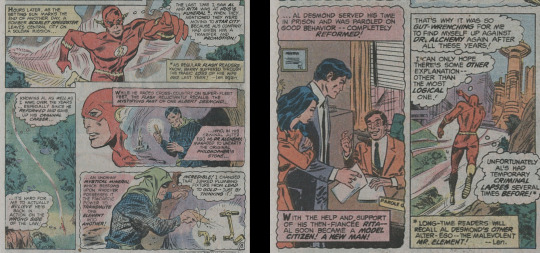
'cause here's the thing: Mister Element appeared in Showcase #13 whereas Dr Alchemy debuted in Showcase #14, where even Flash pointed out the quick change in Desmond's alter ego

What's even more interesting, it seemed like Al just "wanted to be" a criminal
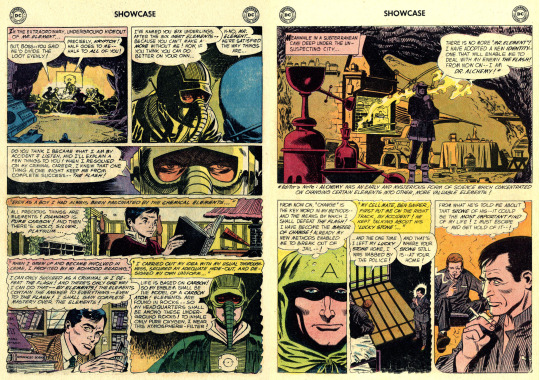
Since then, Al did his time in prison, became a model citizen...
Well, it wasn't perfect, because he happened to have few relapses now and then, whether he:
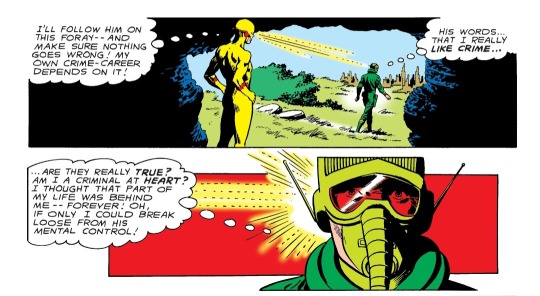
was mind-controlled by Professor Zoom [The Flash #147]
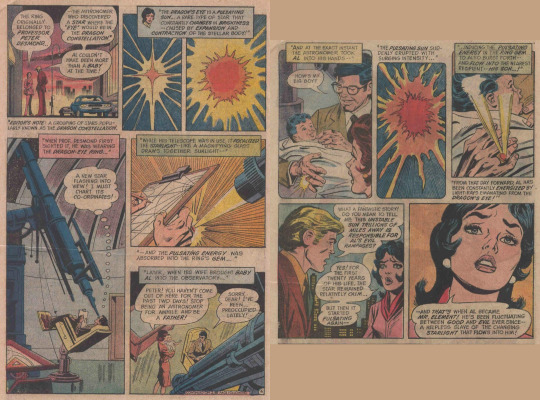
was possesed by this "evil star" that aCtUalLy had been influencing his mental condition from the beginning [The Flash #216]
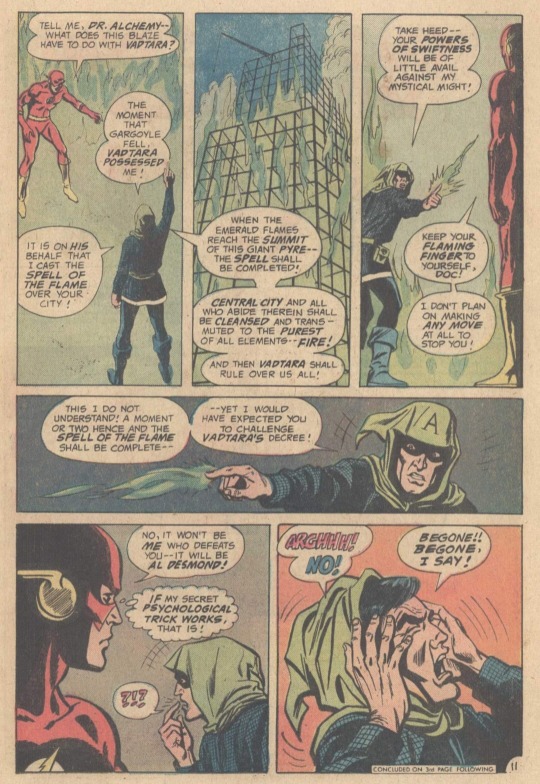
orrr was possesed by a demon? [The Flash #230]
In The Flash #153 Albert feels an urge towards doing evil, hence he behaves compulsively, firstly imitating having a gun, attempting to rob a restaurant and then suiting up in Element's costume
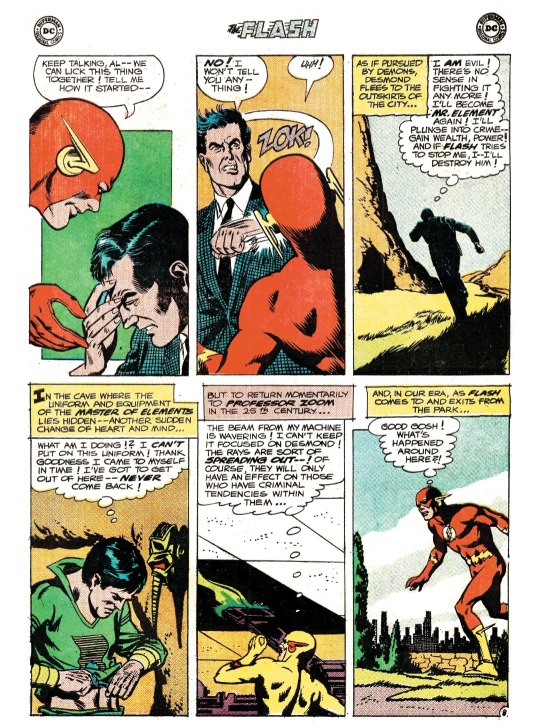
He later returns as Mr Element in order to rescue Flash, simultaneously deceiving Thawne ['cause Zoom believed that was the result of his "evil-making machine"] Fortunately, Barry takes Al to 25th century, where the latter goes through some "electro-re-education programme"
[at least it worked all right here, right Alex DeLarge?]
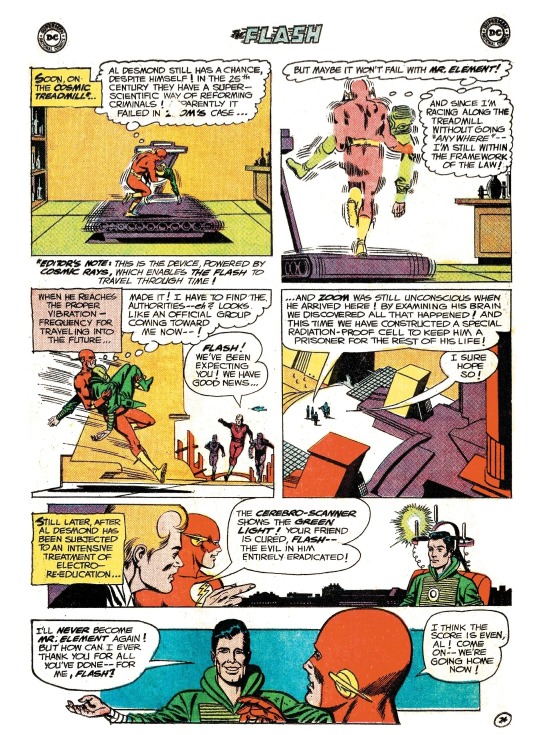
Later on, Al relinquishes "the Dr Alchemy-self" in The Flash #230
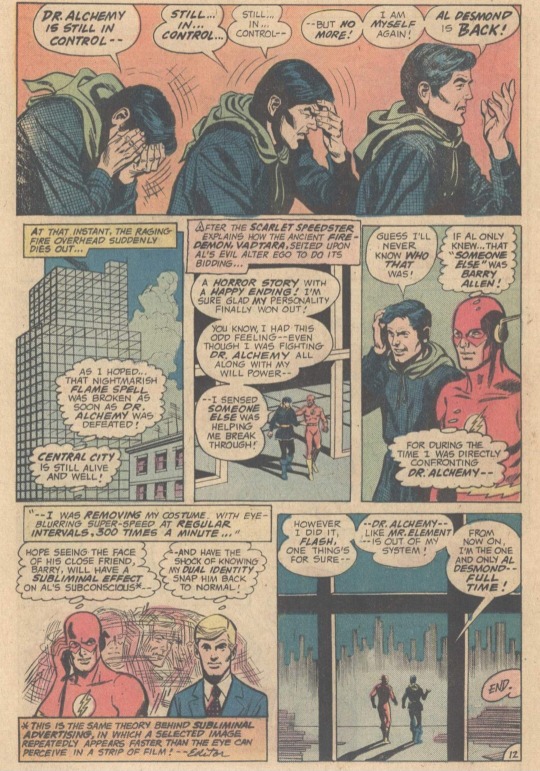
[aight, I know, sorry for this long interlude but I found it necessary to include it - now back to #287]
Upon meeting Desmonds, Rita - Al's wife, reveals that her husband's been absent at the time of Alchemy's assault, further increasing Barry's suspicion; police arrives, takes Albert to custody and not long after - Dr Alchemy escapes, ultimately leading Allen to a terryfying conclusion
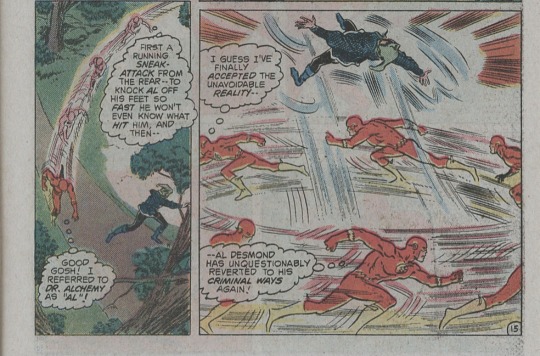
But, reaching the final page, the reader finds out that
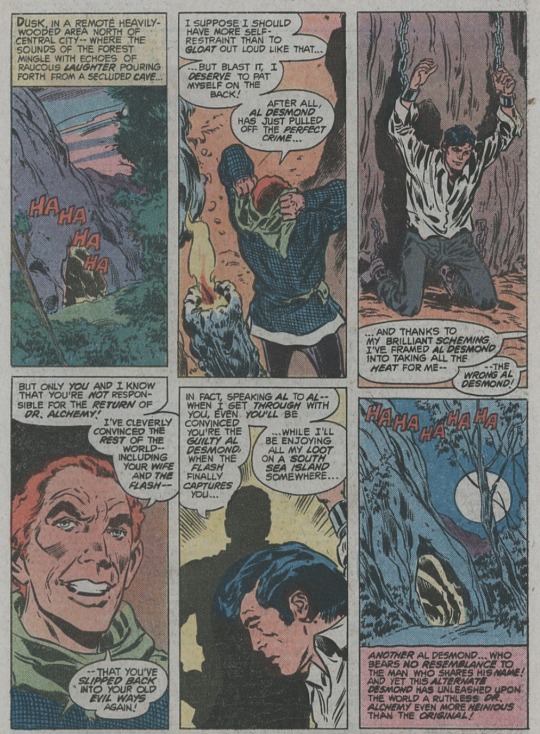
*tum tum tuuuum*
The Flash #288
Soooo the new Dr Alchemy is an Al Desmond. Both Desmonds happen to be "astral/platonic twins":
-they both were born into Desmond families [although they aren't really related]
-they both are fond of chemistry
-they have the same voice
And the most interesting aspect about their "connection" - while one is a good citizen, the other tends to behave violently, albeit this doesn't explain Al's becoming a criminal in the first place
and yeah, second-Albert created a hypnotic serum, which he named...desmondium
...right
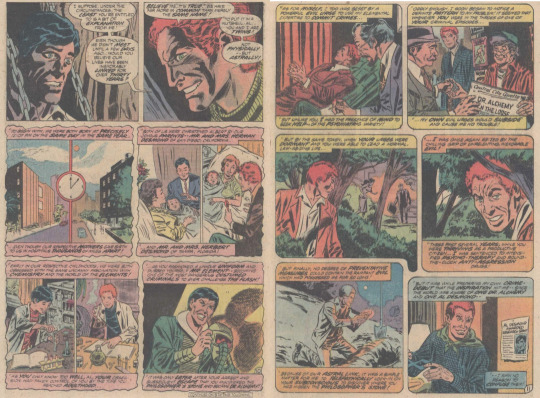
As the second-Albert battles and seemingly wins over Flash, he proudly reveals his secret. Barry obviously gets out of the trap, but at least now his mind is at ease about Albert. Talking about Albert, what's up with him?
...
[*sets "Without me" by Eminem]
The Flash #289

That's right, Mr Element's back in action, but despite his previous returns, this time Al ain't sinister nor controlled - he's deliberately a good guy, whose only goal is to stop Dr Alchemy. Albert donned his old alter ego as he felt responsible for Dr Alchemy's deeds
Barry learns from Rita about Alchemy's potential hideout.
And so, the final battle between Dr Alchemy, Flash and Mr Element...doesn't happen as Al's quickly rendered unconcious, but heyy, Barry's here to save the day
And so, the two pals walk into the night as Al confesses that it's over finally

...
The Flash vol 2 40
Years later, Wally tries to exorcise an irish ghost out of Linda. In order to do that, they pay a visit to Albert Desmond who apparently inhabits now a goth-like mansion
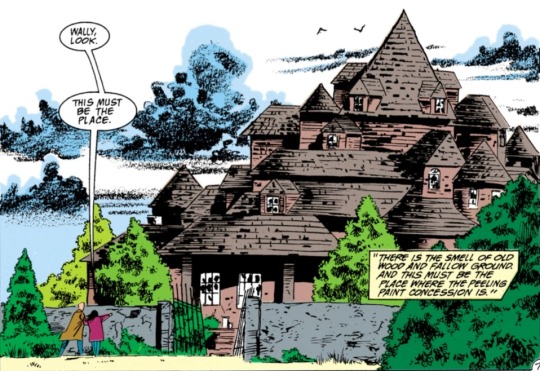
And then...Albert?
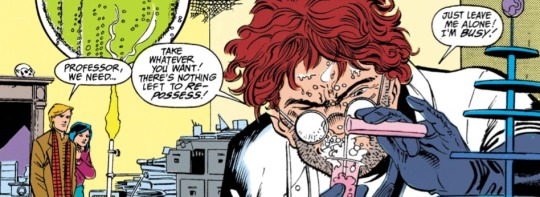
So not only does he look different, but he behaves oddly, too. He's clearly obsessed with recreating the Philosopher's Stone for some reason
aight, it's Alvin

But what is "concerning" is his usage of that stone; Alvin seems out of practice, sloppy and uncreative when it comes to choosing the post-transformed product; he makes a few pauses, ponders too long over what the Stone can transform things into
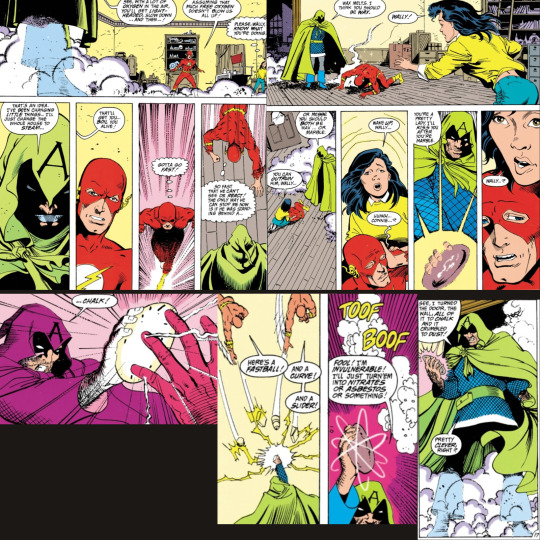
To put it simply, isolation & obession drove him even more insane, rendering him insensible
But well, Wally manages to defeat him; he and Linda find the real Albert Desmond

poor guy...well anyway, hopefully this time it's really ov--

Ehh, for fock's sake...
The Flash vol 2 41
Alvin somehow breaks out [only leaving a salty statue of himself behind in the cell] and creates chaos for kicks, but suprisingly - this time he utilises the Philosopher Stone's powers quite well even going as far as to defeating Wally
Simultaneously Albert returns as Mr Element, but it still isn't enough to beat Alvin
Then a slight retcon happens while Wally realizes that Alvin is pretty much just a manifestation of Al's evilness with fake memories implemented by the Stone itself. In result, Al accepts the reality and destroys Alvin once and for all - FOR REAL this time

In Who's who in DC Universe #14 we find out that, sadly, after retrieving the Philosopher Stone, Albert started to become more and more seduced by his artefact

And it looks like he gave in, 'cause he appears few times in Waid's run
When Johns took over, he made Albert into a stereotypical mystic, who spends a lot of time on reading and practising alchemy [even his cell's been decorated in goth-theme] and he stays this way till N52&Rebirth

But before I get to that "version", lemme talk a bit about the third Alchemy - perhaps the lest known, Curtis Engstrom. He worked as an advisor on a S.T.A.R. Labs project that would use Philosopher's Stone's special properties to cure blood diseases. He of course stole both the device and the Stone. In prison he met a guy, who later tricked him, stealing the device from the first thief. Curtis decided to get his revenge on the guy, got the Philosopher's Stone, calling himself the Alchemist. Engstrom, despite lack of experience, cleverly uses the Stone's power i.e. by creating copper stalagmites while it's raining [electricity conducive] or by lacing an area with thin molybdenum strings [sharp enough to slice Flash] Engstrom only appears in two issues - The Flash #71-72
Rebirth
In Rebirth Albert does appear a few times. In The Flash #764-766 Albert tricks Barry into wielding Philosopher's Stone in order to control Flash himself; oh and he kinda absorbs Stone's powers so he doesn't physically need it anymore
A propos, depending on the issue, Albert either used the Stone to access powers or used it to channel his powers
Exemplary:
-in The Flash #216 Al revealed that the elemental-gun only concencrated his elemental energy, although nothing like this had ever happened before
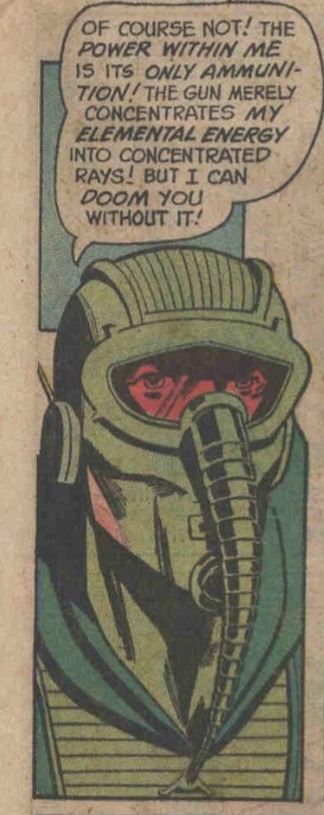
-albeit in The Flash #230 a similar thing happened, this instance regarding Dr Alchemy, thus he didn't need the Philosopher's Stone anymore
-ever since the Alchemy-excorsion, Al has been constantly using his Elemental Gun
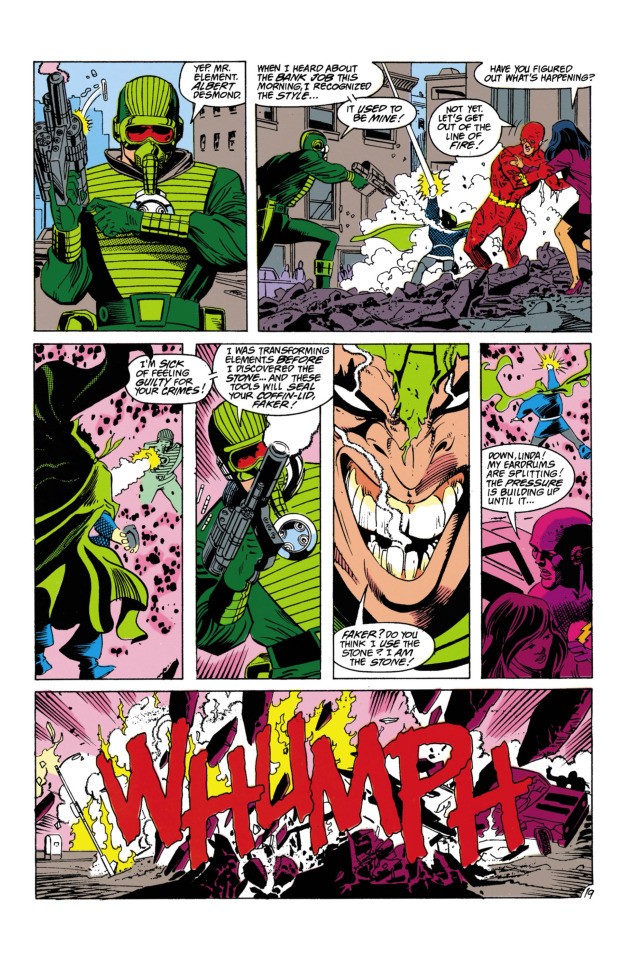
[The Flash #41 & the coolest Mr Element design, along with his cool af machine gun]
-then in Rebirth Al initially used the Philosopher's Stone embeded in a ring, but later he acquired the Stone's powers thanks to lighzinium - a protective material layered on the Flash-ring by Barry
...
Additional notes: °although mostly it's been implied that Al's identity disorder wasn't caused by the Philosopher's Stone, The Flash #765 clearly states a connection between those two aspects °the ring from The Flash #764-766 resembles greatly the Dragon-Eye one back from #216
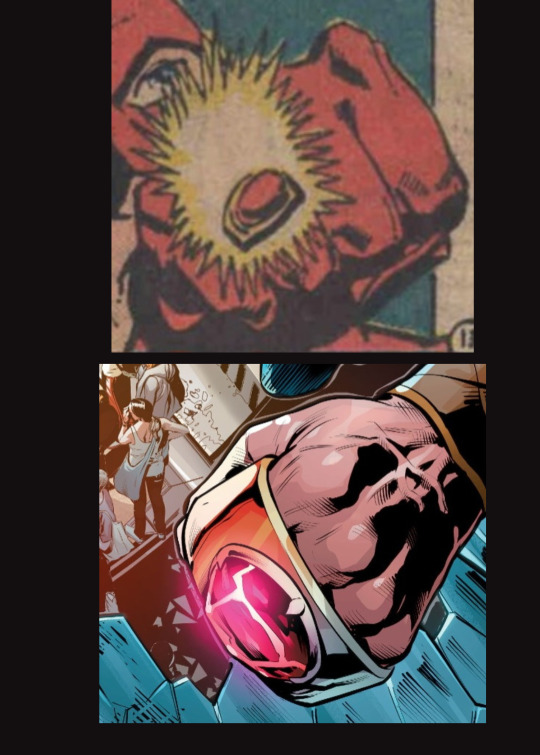
°reaction-image
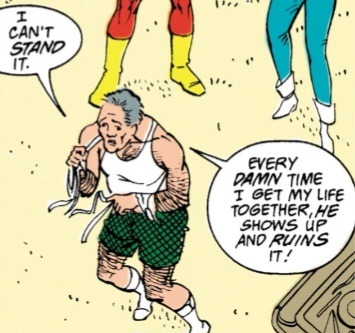
°intriguing, but whenever Dr Alchemy appeared in Waid's Flash-run he has never been referred to by his name; NOT ONCE
In fact in Waid's run he looks a lot more like Alvin, although considering the Who's who in DC Universe we have to think it's actually Allbert
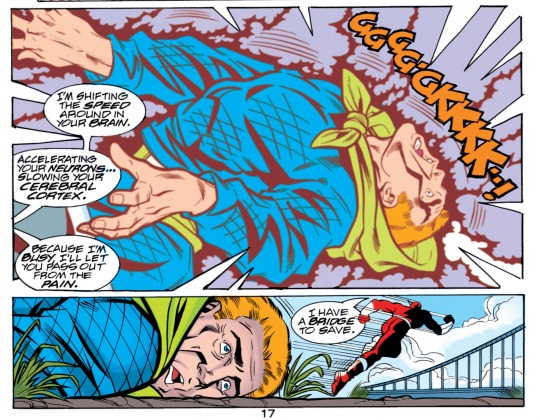
°more interesting, The Flash vol 2 Annual 8 takes place right before Messner-Loebs' run and guess who's the villain of the week?
That's right, Dr Alchemy, whose name's never called out and in opposition to later issues we can't assume it's Albert under the mas--the hood
What's even funnier, present Wally's telling Linda that story, mentioning at the end "amazingly enough, Alchemy would eventually turn up again...and again that's another story"
If Wally'd be talking about #40-#41, then it's stupid cos Linda knows about that incident first hand cos she was there
°[*"The Man who sold the world" plays in the back*]
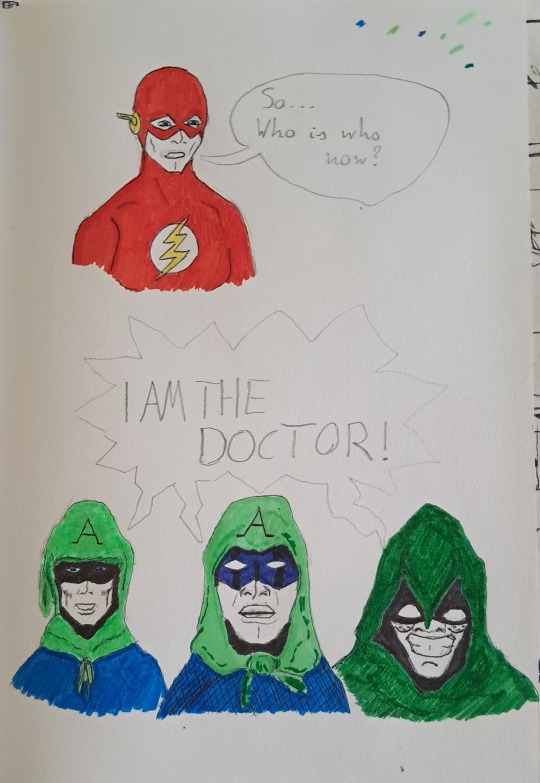
Thug: So uhh mr Desmond, how much of that gold do we need to transform?
Albert:

La-li-lu-le-lo
#dc comics#wally west#dr alchemy#Mister Element#Doctor Alchemy#Albert desmond#Alvin desmond#the flash#barry allen#geoff johns#mark waid#william messner loebs#cary bates#philosopher's stone
4 notes
·
View notes
Text
Fictober 2023
Prompt number #22 Fanfiction Fandom: Flash Rogues Rating: T – Teen and up Warnings: A creepy guy.
Day Twenty-Two: “Who takes care of you?”
The neighbour knocked at the door with some hesitation. She didn’t know the man who lived there, after all, but he did have a reputation for being strange and rude. She’d only seen him twice before, and one of those times he’d leered at her.
But she was a social worker, and she thought it good to help the people around her whenever possible. Maybe the man was just misunderstood.
The door swung open, and Alvin grinned when he saw who it was. “Yeah?” he greeted her, scratching his rear end for an uncomfortably long time.
“Hi, I’m your neighbour Deborah, and I thought it’d be nice to get to know each other,” she said politely, offering a hand to shake despite the scratching. Alvin laughed delightedly.
“Sure, come right in. I’m Doctor Albert Desmond, scientist-at-large.”
Unfortunately, Deborah didn’t know him well enough to realize that he’d given the name of his unlucky twin, as he so often did. She smiled and stepped inside, though the smile became strained once she saw what a mess the place was.
“Siddown and I’ll get you a beer!” Alvin chortled, heading into the kitchen to grab a few cans. She grimaced when she saw a large pile of dirty magazines on the coffee table, but decided it wasn’t her place to judge.
She sat down on the couch and noticed some underwear wedged between the cushions, though she couldn't tell whether it was clean or not. But Alvin then tossed himself onto the seat next to her and offered a can of cheap lager, which at least was still fully sealed.
“So, you said you’re a scientist? What do you do?” she asked kindly.
“Eh, I’m a jack of all trades, really. I work for people who’re willing to pay cash, and do my own research on the side. I’m trying to develop a vaccine for crabs!” he said with great enthusiasm.
The look on his face suggested that he wasn’t trying to save marine life, but the work would probably help people and for that she was glad. Besides, at least he wasn’t cooking drugs, and he seemed far too slovenly to become any kind of so-called “supervillain”. She’d met a few of those in her line of work, one of whom had lived in her last building before it was destroyed in a battle with the Justice League.
She might have had some quibbles with supervillains.
“How long have you lived here?” she asked.
“Oh, I dunno. I think they forgot I’m here, `cause they don’t charge me rent. Or maybe that’s because I turned the super’s desk into salt a while back!” He laughed so hard at this that she frowned with concern; he didn’t seem stable, or to have much grasp on reality. Maybe she and her colleagues really would need to intervene.
“Who takes care of you, Albert? Do you have anyone in your life to check on you, and make sure you’re okay?”
He seemed puzzled. “Whaddya mean? I'm a bachelor, living a wild swinging single-guy life! Nobody tells me what to do!”
“So, um, I’m going to give you the number of somebody who can help, and he’ll come over to talk to you later this week,” she said evenly as she scribbled a phone number on a piece of paper. He took it and stared.
“Is this some kind of therapy thing? Because I don’t do therapy anymore.”
“We just want to make sure you’re all right.”
He sighed, and looked genuinely regretful.
“So, this is gonna end in one of two ways: I give you lots of gold to make you scram, or I threaten you and/or actually turn you into salt to make you gone. So I guess that’s really one of three ways, sorry. Which is it gonna be?”
“Albert, I…”
He pulled the Philosopher’s Stone from his pocket, and suddenly the cheap wooden coffee table became sodium. Then it was tungsten. Then it was transformed into pure helium, quickly dissipating into the atmosphere.
“Crap, now I need another table,” he muttered under his breath. “Anyway, the point is, I can do it and I mean it. I think you’re hot, so I’m giving you a choice most people don’t get. What’s it gonna be?”
“…I’ll take the gold, and I’m going to move out right away. You won’t hear from me again.”
She absolutely meant it.
“That’s my girl!” he grinned, and clapped his hands triumphantly. “You made the right call, and I’ll give ya all the gold you can carry. But just between you and me, d’you have any interest in the ol’ slap n’ tickle?”
She tried very intently to keep her face neutral lest he take offence. “Um, no thank you.”
“Too bad, you’re a total babe. Well, a deal’s a deal.”
Alvin searched for the remnants of his half-eaten lunch and turned them into solid gold, and he grabbed a few of his least-favourite magazines and subjected them to the same fate.
“They’ll melt down as well as any gold bar,” he shrugged when she gave him a funny look. But right now she didn’t care about all the weirdness anymore, and hurried to the exit with her heavy gleaming burden.
“You know where I am if you change your mind about the tickles!” he called as she speed-walked to her apartment and slammed the door behind her.
She took a deep breath once she felt (mostly) safe. She was going to pack a few things, head to a motel, and hire movers to take the rest of her possessions away as soon as possible. The gold would pay for a new start in life, and it was time to leave the city of Keystone and its madness far behind.
9 notes
·
View notes
Text
Aamir Aaron Abdul Adam Adan Adel Adonis Adrjan Adrjen Aidan Aiden Aja Ajmad Ajmed Al Alajn Alan Albert Alberto Alek Alen Alessandro Alek Alekander Alekis Alfonso Alfrado Alfred Alfredo Ali Alistajr Alistajre Alvin Ameen Amin Amir Amjas Anand And Andre Andreas Andres Andrew Angel Angelo Anselm Antjon Antojne Anton Antonjo Antwan Ari Arjun Armando Arnje Arnold Art Artjur As Asjle Asjton Augustine Aureljo Austin Aver Akel Bajl Bajle Bajleig Baltjassar Barr Barrett Bart Bartjolomew Basjeer Beau Ben Benett Benito Benjamin Benji Bernard Bilal Bjorn Bjron Blade Blajne Blajr Blake Bo Bob Bojd Bojke Brad Bradford Bradle Bram Brandon Brant Brantle Brenan Brendan Brendon Brenon Brent Brenton Bret Brett Brik Brjan Brjke Broderik Brodje Brok Bronson Brook Bruke Bruno Dakota Dalas Dale Damjan Damjen Damjon Damon Dan Dane Danjel Darb Darjo Darjus Dark Darnel Darren Darrjl Dav Dave David Davis Dawson Dean Deandre DeAngelo DeJuan Del Demetri Demetrjus Denis Denzel Deon Derek Desmond Dev Devin Devon Dewe DeWitt Dekter Dik Dirk Djego Djlan Djon Dojle Dom Dominik Don Donald Donavin Donel Donje Donovan Donte Doug Douglas Drew Duane Dunkan Dust Dustin Dwajne Dwigjt Earl Ed Edgar Eduardo Edward Edwin Eli Elija Elis Eljas Eljott Elro Elton Elvis Emanuel Emer Emett Emil Emiljo Emor Enriko Enrikue Enzo Erik Ernest Ernje Esteban Etjan Eugene Evan Ezra Fabjo Farouk Faruk Felipe Felik Fernando Ferris Filippo Fin Flint Flojd Forrest Frank Frankisko Frankje Franklin Franko Fraser Fred Frederik Fritz
abe Gabrjel Gage Galen Gar Garet Garret Garrett Gart Gavin Genaro Gene Geoffre George Gerald Geraldo Gerik Gil Gilbert Gilberto Giles Gino Gjorgjo Gjovani Gjuseppe Glen Gord Gordje Gordon Grajam Grajson Grant Greg Gregor Grejson Gu Gus Hajden Hakeem Hal Halim Hamis Hamza Hank Hans Harlan Harold Harr Harrison Harve Hassan Heat Hektor Heljas Hendrik Henr Herb Herbert Herbje Herk Herkules Herman Homer Houston Howard Howel Howje Hudson Hue Hug Hugo Hunter Husajn Hussein Ian Ike Iljam Imani Imanuel Ira Irwin Isa Isaak Isaja Ivan Ja Jabar Jabbar Jaden Jafar Jajden Jajme Jajvaugjn Jak Jakob Jakkues Jakson Jaleel Jalil Jalinson Jamaal Jamal Jamar Jamel James Jamil Jamison Jamje Jan Jane Janike Janikua Janikue Janikuea Jared Jaron Jase Jason Jasper Javjer Javon Jak Jakon Jakson Jean-Luk Jean-Paul Jeb Jebedja Jed Jededja Jeff Jeffre Jem Jerem Jeremja Jermajne Jerome Jerr Jess Jesse Jesús Jet Jetjro Jett Jim Joakujn Joe Joel Jojn Jon Jona Jonas Jonatjan Jonatjon Jord Jordan Jorge Jos Jose Josep Josjua Juan Judd Jude Juljan Juljo Justin Ka Kaden Kajden Kal Kaleb Kaleel Kalil Kalob Kalvin Kameron Kami Kamilo Kare Kareem Karl Karlo Karlos Karlton Karr Karson Karter Kase Kaseem Kasim Kaspar Kasper Kassjus Kedrik Keegan Keenan Keit Kel Kelan Kelvin Ken Kenan Kendal Kendrik Kenet Kenon Kent Kero Kesar Keven Kevin Kile Kim Kimo Kirb Kirk Kit Kja Kjad Kjalil Kjandler Kjanke Kjarles Kjarlje Kjase Kjester Kjet Kjiko Kjle Kjris Kjristjan Kjristopjer Kjrus Kjuk Kla Klajton Klarenke Klark Klaude Klem Klete Kletus Kleve Kleveland Kliff Klifford Klifton Klint Klinton Klive Kod Kolb Kole Kolin Kolton Konor Konrad Konstantine Kor Kore Kosmo Krajg Kris Krisjna Kristjan Kurl Kurt Kurtis Kwame Kweisi Lajne Lamar Lamont Lane Lanke LaRon Larr Lars Lateef Lawrenke Leandro Lee Leland Len Leo Leon Leonard Leonardo Lero Les Leslje Lester Levi Lewis Linkoln Ljam Ljle Ljman Ljndon Llojd Logan Lon London Lonje Lorenzo Lou Loujs Lujs Luka Lukas Luke Lukjus Majmoud Makenzje Malik Malkolm Man Mansoor Mansur Manuel Marjo Mark Marko Markos Markus Markye Markujs Marsjal Mart Martin Marvin Mason Masoud Mateo Matjeo Matt Matteo Mattjeo Mattjew Maurike Mak Makimiljan Makwel Mejdi Mel Melvin Miguel Mika Mike Mikjael Miles Milo Mitk Mitkjel Mojamed Mont Monte Morgan Morris Names Nat Nate Natjan Natjanjel Ned Neil Nelson Nestor Nevile Nigel Nik Nikjolas Niko Nikola Nikolaus Nils Nino Njels Noa Noe Norm Norman Odin Oliver Omar Oogje Orjon Orlando Oskar Otjer Owen Pablo Pajne Palmer Paolo Paris Parker Pat Patrik Paul Pedro Perk Perr Pete Peter Pjerke Pjerre Pjetro Pjil Pjilip Pjilippe Pranav Pres Preskott Preston Kuentin Kujnt Kujnton R Ra Rafael Rafik Rajeem Rajeev Rajim Rajiv Rajmi Rajmond Rale Ralp Ramiro Ramón Rand Randal Randolp Rapjael Rasjaad Rasjad Rasjeed Rasjid Raul Ravi Reagan Reed Reeke Reese Reggje Reginald Reid Reil Rembrandt Remington René Reuben Rek Rik Rikardo Rikjard Rile Ritkye Rjan Ro Rob Robert Roberto Robin Rod Rodne Roger Rojke Rok Rol Roland Rolando Roman Romeo Ron Ronald Ror Roskoe Ross Ruben Rud Rudolf Rudolp Russ Russel Rust Sal Salvador Sam Sameer Samir Samuel Sand Sanja Sankjo Santjago Saul Sawjer Sean Sebastjan Sebi Sergjo Set Sid Sidne Silas Simon Sjad Sjane Sjanon Sjareef Sjarif Sjaun Sjawn Sjdne Sjea Sjeldon Sjerm Sjerman Sjervin Skott Slade Smas Sokrates Solomon Spenker Stan Stanle Stefano Stepjan Stepjano Stepjen Steve Steven Stewart Stone Storm Stuart Sulajman Sven Tad Tajlor Tal Taner Tarik Tate Tawfik Ted Tel Teo Terr Terrel Terrenke Tim Timoty Tjaddeus Tjeodore Tjler Tjom Tjomas Tjrone Tjson Tob Tobjas Todd Tom Ton Topjer Trak Trake Trav Travis Tre Trent Trenton Trev Trevor Tristan Tro Tuk Tuker Tul Turner Van Vanke Vern Vernon Vikram Viktor Vinke Vinkent Virgil Wade Wajne Walker Walt Walter Ward Warren Webster Wendel Wes Wesle Weston Wil Wilfredo Wiljam Wjatt Wjit Wjitne Kavjer Zak Zakjar Zakjarja Zander Zane Zavjer Zedrik Zeke Zepyr
7 notes
·
View notes
Text
Discus elbow smash
• BART
• DERRICK
• NERISSA
• HARRIET BLUSTER
• EDWINA
• DENNIS
• SHIRLEY HOC
• MATT MXUOLBNUKW
• ALVIN HATER
• EDDIE DEARBORN
• BRENDA STAUNTON
• EDNA ENTERTAIN
• JENNIE
• RODNEY CATKIN
• BRADFORD
• SIERRA CHASSIS
• EDGAR PAGE
• FREDERICK CAMILLE JAMAICA
• JACQUELINE SEROLOGY
• CHRISTENSEN
• BERNIE
• OTTO RIVER
• XU
• FERREIRA
• TOMAS KENT
• DOCTOR'S OFFICE!/STRONG/FONT
• FRANCISCO ERICSSON
• HARLEY SHANK
• ADMIRAL ACCORDANT
• ALIA ANIMADVERSION
• LY
• COREY
• GALE GOSPEL
• MAXIMILIAN MASON
• LI
• KIA NG
• ADAM
• BRADFORD DRAFT
• STEPHANIE
• EVELYN INCREMENT
• BUDDY
• ABIGAIL COUNTERVAIL
• FATIMA MICROGRAPHY
• ED
• MCDOUGALL
• DONOVAN
• GEN * ERIC VIAG
• GONZALEZ
• DIANA BUTYL
• MAX
• MARY EYELASH
• ADELAIDE
• DIXIE
• MARTHA IDA
• DELILAH REEL
• ETHEL BORDEAUX
• ANDREW
• GEN ERIC VIAGR
• HANK
• REP DELLA
• MICHELLE ARWPWVCYXDNSW
• CECILIA ARMADILLO GEOFFREY ASS
• JEWEL PEGGY
• MASON
• AUBREY
• HELEN CRAIG
• BAUER
• CATHERINE
• NATHAN
• HTM
• PABLO FISCHER
• CANDACE ICHNEUMON
• FREDERICK THRONG
• EMERALD
• JAIME DELGADO
• GEORGE
• GLENDA
• AARON CRT
• ALEXANDER
• LORELEI
• TOD
• ANGELINE
• MAY
• ABEL
• LANCE
• ARTURO
• CLARK
• MARCIA PROTOZOAN
• DESMOND RAY
• DUANE PROCEDURE
• HUBER
0 notes
Text
Remembering Our Veterans: Stories of Heroism and Sacrifice
Remembering Our Veterans: Stories of Heroism and Sacrifice http://chuckschmalzried.net/remembering-our-veterans-stories-of-heroism-and-sacrifice/?utm_source=rss&utm_medium=rss&utm_campaign=remembering-our-veterans-stories-of-heroism-and-sacrifice Veterans Day is a time to honor and remember the countless men and women who have served their countries in the armed forces. It is an opportunity to pay tribute to their courage, dedication, and sacrifices. Each veteran has a unique story, and their experiences often exemplify the heroism and selflessness that characterize their service. This article highlights a few of these stories to commemorate the brave veterans who have made a difference. Audie Murphy: Audie Murphy, one of World War II’s most decorated American combat soldiers, received 33 awards and decorations, including the Medal of Honor. Murphy’s heroism is best exemplified during a battle in France when he held off a German company of soldiers, called in artillery fire on his position, and then led a successful counterattack.�� Desmond Doss: Desmond Doss, a Seventh-day Adventist and conscientious objector, served as a combat medic in World War II without carrying a weapon. Despite facing intense combat and refusing to bear arms, Doss saved 75 men during the Battle of Okinawa, earning him the Medal of Honor. Alvin York: Sergeant Alvin York was a highly decorated U.S. soldier during World War I. In the face of heavy enemy fire, he captured 132 German soldiers and silenced 35 machine guns, a feat for which he was awarded the Medal of Honor. York’s story is an example of remarkable courage and resourcefulness. Harriet Ida Pickens and Frances Wills: During World War II, Harriet Ida Pickens and Frances Wills made history as the first African American WAVES (Women Accepted for Volunteer Emergency Service) officers. They broke racial and gender barriers by enlisting in the U.S. Navy, paving the way for future generations of women of color to serve in the armed forces. General Norman Schwarzkopf: General H. Norman Schwarzkopf, known as “Stormin’ Norman,” commanded coalition forces during Operation Desert Storm in the early 1990s. His leadership and strategic insight played a pivotal role in Kuwait’s swift and successful liberation from Iraqi forces. Mary Edwards Walker: Dr. Mary Edwards Walker, a contract surgeon for the Union Army during the Civil War, became the first and only woman to receive the Medal of Honor. She served in numerous battles, including Bull Run, Fredericksburg, and Chickamauga, where she was captured and held as a prisoner of war. Robert Maxwell: Technical Sergeant Robert D. Maxwell, a World War II veteran, demonstrated incredible heroism during the D-Day invasion of Normandy. He led his unit through fierce enemy fire to achieve their mission and saved many lives. Maxwell was awarded the Medal of Honor for his extraordinary bravery. John Basilone: Sergeant John Basilone was a Marine Corps veteran who received the Medal of Honor for his heroic actions during the Battle of Guadalcanal. His leadership and bravery in intense combat were instrumental in repelling enemy forces. It’s essential to remember and honor the brave men and women who have served in the military, protecting the values and freedoms that we hold dear. These stories remind us of the remarkable individuals who have answered the call to serve their nations. They inspire us to express gratitude and appreciation for their selflessness and sacrifices. The post Remembering Our Veterans: Stories of Heroism and Sacrifice first appeared on Chuck Schmalzried | Stories of Heroes. via Chuck Schmalzried | Stories of Heroes http://chuckschmalzried.net November 07, 2023 at 12:15PM
0 notes
Text
Flash Video Game Proposals
read it on the AO3 at https://ift.tt/ZwA9TGx
by Longitudinalwave
Since the Flash hasn't ever had a prominent video game, I decided to come up with plots for two of them!
Words: 12663, Chapters: 7/7, Language: English
Fandoms: The Flash (Comics), The Flash - All Media Types
Rating: General Audiences
Warnings: No Archive Warnings Apply
Categories: F/M
Characters: Wally West, Barry Allen, Linda Park, Iris West, Fred Chyre, Jared Morillo, Jay Garrick, Joan Garrick, Iris West II, Jai West, Dexter Myles, Paul Gambi, Leonard Snart, Lisa Snart, Roscoe Dillon, Mark Mardon, Amunet Black, Tony Woodward, Michael Christian Amar, Axel Walker, Sam Scudder, James Jesse, Evan McCulloch, Mick Rory, Hartley Rathaway, George "Digger" Harkness, Roy Bivolo, Josh Jackham, Julie Jackham, Henry Allen, Nora Allen, Rachel Rathaway, Osgood Rathaway, Albert Desmond, Rita Desmond, Alvin Desmond
Relationships: Linda Park/Wally West, Barry Allen/Iris West, Roscoe Dillon/Lisa Snart, Albert Desmond/Rita Desmond, Jay Garrick/Joan Garrick
read it on the AO3 at https://ift.tt/ZwA9TGx
0 notes
Photo

Dr. Alchemy would be perfect as a homunculus in a DC/FMA crossover
15 notes
·
View notes
Text
Flash Season 5 Villain
Okay okay okay so I was looking up confirmed characters and confirmed plot points for next seasons of supergirl, flash, arrow and legends of tomorrow. For flash, a character named Desmond Paul was confirmed.

So this guy is immortal and basically can cancel out other meta powers. But in the comics, we have this nutsack:

Alright? But the thing is, although the powers and the whole philosopher stone fits in the immortality thing, it clicked to me what the whole motive of this villain was: and here it is:

Because yes I’ve read some of the comics from the New 52 Superboy and Ravagers where the organization NOWHERE appears along with its leader, Harvest. This guy’s motive is straight on with Desmond Paull’s motives on the next season of flash, assuming the information is correct, of course.
So the thing is, I really hope they use the story line to bring in some of these characters because although it was too much to read the comics from New 52, I do love some aspects from it. Like how Rose Wilson was assigned as Superboy’s handler? Hell yes. And how she and Caitlin Fairchild were bffs? Hell yes. And Rose’s psychic powers are even more developed and I LOVE that. It would be so cool to see if my theory does line up and if it is in fact inspired by these comics 😇

#dc comics#ravager#rose wilson#superboy#conner kent#kon el#jon lane kent#harvest#NOWHERE#desmond paull#flash#barry allen#flash season 5#dr alchemy#Alvin Desmond#caitlin fairchild#ravagers#my post
11 notes
·
View notes
Text
Flash Characters and the Myers-Briggs Personality Test
I ran the Myers-Briggs Personality test over and over again so that I could get the results for as many Flash characters as I could think of. Here's what I found:
The Top (Roscoe Dillon)
Architect
INTJ-T
Rational – People with the INTJ personality type (Architects) pride themselves on the power of their mind. They can reframe nearly any challenge as an opportunity to hone their rational thinking skills and expand their knowledge – and with this mindset, they can devise inventive solutions to even the most arduous of problems.
Informed – Few personality types are as devoted as INTJs to developing rational, correct, and evidence-based opinions. Rather than hunches or half-baked assumptions, they base their conclusions on research and analysis. This gives them the conviction that they need to stand up for their ideas, even in the face of disagreement.
Independent – For people with this personality type, conformity is more or less synonymous with mediocrity. Creative and self-motivated, INTJs strive to do things their own way. They can imagine few things more frustrating than allowing arbitrary rules or conventions to stand in the way of their success. Moreover, they are happy to make decisions without outside input or opinions. These individuals prefer to take matters into their own hands.
Determined – This personality type is known for being ambitious and goal-oriented. INTJs won’t rest until they’ve achieved their own definition of success – which usually entails mastering the subjects and pursuits that matter to them. They are not known for taking the easy way out. They feel that the only way to achieve greatness is to face challenges head on.
Curious – INTJs are open to new ideas – as long as those ideas are rational and evidence based, that is. Skeptical by nature, people with this personality type are especially drawn to offbeat or contrarian points of view. And if the facts prove them wrong, these types are generally happy to revise their opinions.
Original – Without INTJs, the world would be a far less interesting place. This personality type’s rebellious streak is responsible for some of history’s most unconventional ideas and inventions. Even in their everyday lives, these personalities force the people around them to consider new (and sometimes surprising) ways of looking at things.
Arrogant – INTJs might be knowledgeable, but they’re not infallible. Their self-assurance can blind them to useful input from other people – especially anyone they deem to be intellectually inferior. These personalities can also come across as needlessly harsh or single-minded in trying to prove others wrong.
Dismissive of Emotions – For this type, rationality is king. But emotional context often matters more than people with this personality type care to admit. INTJs can get impatient with anyone who seems to value feelings more than facts. Unfortunately, ignoring emotion is its own type of bias – one that can cloud this personality type’s judgment.
Overly Critical – These personalities tend to have a great deal of self-control, particularly when it comes to thoughts and feelings. When the people in their lives fail to match their level of restraint, INTJs can appear scathingly critical. But this criticism can be unfair – based on arbitrary standards rather than a full understanding of human nature.
Combative – People with this personality type hate blindly following anything without understanding why. This includes restrictions and the authority figures who impose them. INTJs can get caught up in arguing about useless rules and regulations – but sometimes these battles are distractions from more important matters.
Socially Clueless – INTJs’ relentless rationality can lead to frustration in their social lives. Their efforts to defy expectations may leave them feeling isolated or disconnected from other people. At times, these personalities may become cynical about the value of relationships altogether, questioning the importance of love and connection.
Trickster (James Jesse)
Campaigner
ENFP-A
Curious – People with the ENFP personality type (Campaigners) can find beauty and fascination in nearly anything. Imaginative and open-minded, ENFP personalities aren’t afraid to venture beyond their comfort zone in search of new ideas, experiences, and adventures. Moreover, their curiosity extends beyond simply seeking novelty. They also have a deep desire to understand how things work and why they are the way they are.
Perceptive – To people with this personality type, no one is unimportant – which might explain how they can pick up on even the subtlest shifts in another person’s mood or expression. Because they’re so sensitive to other people’s feelings and needs, ENFPs can make full use of their caring, considerate nature.
Enthusiastic – When something captures their imagination and inspires them, ENFP personalities want to share it with anyone who will listen. And they’re just as eager to hear other people’s ideas and opinions – even if those thoughts are wildly different from their own.
Excellent Communicators – People with the ENFP personality type brim with things to say, but they can be caring listeners as well. This gives them a nearly unmatched ability to have positive and enjoyable conversations with all sorts of people – even people who aren’t particularly sociable or agreeable.
Easygoing – ENFPs may live for deep, meaningful conversations, but they can also be spontaneous and lighthearted. These personalities know how to find fun and joy in the present moment – and few things give them more pleasure than sharing their joy with others.
Good-Natured and Positive – All of these strengths come together to form a person who is warmhearted and approachable, with an altruistic spirit and a friendly disposition. ENFPs strive to get along with pretty much everyone, and their circles of acquaintances and friends often stretch far and wide.
People-Pleasing – Most people with the ENFP personality type are uncomfortable with the prospect of being disliked. To maintain the peace, they may compromise on things that matter to them or allow others to treat them poorly. And when they fail to win someone over, they might lose sleep trying to figure out what to do about it.
Unfocused – The thrill of a new project – especially one that involves collaborating with other people – can bring out the best in these personalities. But ENFPs are known for having ever-evolving interests, meaning that they may find it challenging to maintain discipline and focus over the long term.
Disorganized – ENFPs’ focus on the big picture and their love for exploring new ideas and experiences can sometimes overshadow their attention to everyday practical matters. Specifically, people with this personality type may try to avoid the routine tasks that they view as boring like household chores, basic maintenance, or paperwork. The resulting sense of disorganization can become a major source of stress in their life.
Overly Accommodating – ENFP personalities feel called to uplift others, and they may find themselves saying yes whenever anyone asks them for guidance or help. But unless they set boundaries, even the most energetic among them can become overcommitted, with too little time and energy to tackle the necessities of their own life.
Overly Optimistic – Optimism can be among this personality type’s key strengths. But ENFPs’ rosy outlook can lead them to make well-intentioned but naive decisions, such as believing people who haven’t earned their trust. This trait can also make it difficult for these personalities to accept hard but necessary truths – and to share those truths with others.
Restless – With their positive, upbeat attitude, ENFPs rarely seem upset or dissatisfied on the outside. But their inner idealism can leave them with a nagging feeling that some major areas of their life just aren’t good enough – whether that’s their work, their home life, or their relationships.
Mirror Master I (Sam Scudder)
Debater
ENTP-A
Knowledgeable – People with the ENTP personality type (Debaters) rarely pass up a good opportunity to learn something new, especially abstract concepts. This information isn’t usually absorbed for any planned purpose as with dedicated studying – they just find it fascinating.
Quick Thinkers – ENTP personalities have tremendously flexible minds and are able to shift from idea to idea with little effort, drawing on their accumulated knowledge to prove their points, or their opponents’, as they see fit. In fact, ENTPs are the most likely personality type to quickly jump from one topic to another when they are enthralled in a conversation, never missing a beat.
Original – Having little attachment to tradition, ENTP personalities are able to discard existing systems and methods and pull together disparate ideas from their extensive knowledge base to formulate bold new ideas. If presented with chronic, systemic problems and given rein to solve them, they respond with unabashed glee.
Excellent Brainstormers – Nothing is quite as enjoyable to people with the ENTP personality type as analyzing problems from every angle to find the best solutions. Combining their knowledge and originality to splay out every aspect of the subject at hand, rejecting without remorse options that don’t work, and presenting ever more possibilities, ENTPs are irreplaceable in brainstorming sessions.
Charismatic – People with the ENTP personality type have a way with words and wit that others find intriguing. Their confidence, quick thought, and ability to connect seemingly separate ideas in novel ways create a style of communication that is charming, even entertaining, and informative at the same time.
Energetic – When given a chance to combine these traits to examine an interesting problem, ENTP personalities can be truly impressive in their enthusiasm and energy, having no qualms with putting in long days and nights to find a solution.
Very Argumentative – If there’s anything ENTPs enjoy, it’s the mental exercise of debating an idea. More consensus-oriented personality types rarely appreciate the vigor with which these personalities tear down their beliefs and methods, sometimes leading to a great deal of tension.
Insensitive – Being so rational, ENTPs often misjudge others’ feelings and push their debates well past others’ tolerance levels. People with this personality type don’t really consider emotional points to be valid in such debates either, which magnifies the issue tremendously.
Intolerant – Unless people are able to back up their ideas in a round of mental sparring, ENTPs are likely to dismiss not just the ideas but the people themselves. Either a suggestion can stand up to rational scrutiny, or it’s not worth bothering with.
Can Find It Difficult to Focus – The same flexibility that allows ENTP personalities to come up with such original plans and ideas makes them readapt perfectly good ones far too often or to even drop them entirely as the initial excitement wanes and newer thoughts come along. Boredom comes too easily for these active types, and fresh thoughts are the solution, though not always a helpful one.
Dislike Practical Matters – ENTPs, with their preference for spontaneity and novelty, often struggle with organization, structure, and all things practical. People with this personality type are interested in what could be – malleable concepts like ideas and plans that can be adapted and debated. When it comes to hard details and day-to-day execution, these personalities tend to lose interest, often with the consequence of their plans never seeing the light of day.
Captain Cold
Logistician
ISTJ-A
Honest and Direct – Integrity is at the heart of people with the ISTJ personality type (Logisticians). Emotional manipulation, mind games, and lies of any kind all run counter to their preference for managing the reality of the situations that they encounter with plain and simple honesty.
Disciplined – ISTJs embody integrity through both their words and their actions. Patient and determined, people with this personality type meet their obligations and keep their promises, period. They value structure, follow rules strictly, and respect authority, showcasing their strong will and dutiful nature.
Very Responsible – ISTJs would rather power through and lose sleep than fail to deliver the results that they said they would. Loyal and reliable, they almost always fulfill their duties to the people and organizations that they’ve committed themselves to, and they do so on time and with strict adherence to whatever guidelines were set in place.
Calm and Practical – None of their promises would mean much if ISTJ personalities lost their tempers and broke down at every sign of hardship – they tend to keep their feet on the ground and make clear, rational decisions. Other people’s preferences might be taken into consideration in the process, but ultimately, their decisions are made with practicality in mind.
Organized and Effective – The primary goal of any ISTJ personality is to be effective in what they’ve chosen to do, and they believe that this is accomplished best when everyone involved knows exactly what is going on and why. Clear rules and regulations help people with this personality type maintain order and work in a productive manner.
Research-Oriented – ISTJs are proud repositories of knowledge, with an emphasis on procedures and techniques that enable reliable outcomes. This allows ISTJ personalities to apply themselves to a variety of situations with success, picking up and applying new data as needed to maintain functionality.
Stubborn – The facts are the facts, and people with the ISTJ personality type tend to resist any new idea that isn’t supported by those facts. This factual decision-making process makes it difficult for them to accept that they were wrong about something – but anyone can miss a detail, even ISTJs.
Insensitive – While not intentionally harsh, ISTJs often hurt more sensitive types’ feelings by the simple mantra that honesty is the best policy. These personalities may take emotions into consideration, but really only so far as to determine the most effective way to say what needs to be said.
Always by the Book – ISTJs believe that things work best with clearly defined rules, but this makes them reluctant to bend those rules or try new things even when the downside is minimal. Truly unstructured environments tend to leave these personalities stressed and dissatisfied.
Judgmental – Because ISTJs tend to highly value facts and empirical evidence, they are unlikely to respect people who disagree with proven information – especially those who remain willfully ignorant. When others disregard concrete evidence and instead rely on assumptions or emotions, ISTJs can become judgmental, viewing these individuals as irrational or misguided.
Prone to Burnout – All this can combine to make people with the ISTJ personality type believe that they are the only ones who can see projects through reliably. As they load themselves with extra work and responsibilities, turning away good intentions and helpful ideas, they sooner or later hit a tipping point where they simply can’t deliver. Since they’ve heaped the responsibility on themselves, ISTJs may then believe that the responsibility for failure is theirs alone to bear.
Heat Wave (Mick Rory)
Defender
ISFJ
Supportive – People with the ISFJ personality type (Defenders) truly enjoy helping others, and they happily share their knowledge, attention, and expertise with anyone who needs it. ISFJs strive for win-win situations, choosing teamwork over competition whenever possible.
Reliable – Rather than working in sporadic, excited bursts that leave things half finished, ISFJ personalities are meticulous and careful. They take a steady approach, ensuring that things are done to the highest standard – often going well beyond what is required. Further, most ISFJs agree that sustaining discipline and reliability becomes easier with time.
Observant – ISFJ personalities have a talent for noticing things, particularly about other people. They pay attention to the smallest details of what someone says and does, giving them unexpected insights into other people’s lives and emotions.
Enthusiastic – When the goal is right, ISFJs apply all of their gifts to something that they believe will make a real, positive difference in people’s lives – whether that’s fighting poverty with a global initiative or simply making a customer’s day at work.
Hardworking – ISFJs don’t just get their work done – they take pride in going above and beyond all of their tasks and responsibilities. People with this personality type often form an emotional attachment to the projects and organizations that they’ve dedicated themselves to, and they won’t rest until they’ve done their share – or more than their share – to be of help.
Good Practical Skills – The ISFJ personality type offers the rare combination of an altruistic nature and hard-won practicality. They don’t just hope to help others. They take action – meaning that they’re more than happy to roll up their sleeves and do what’s necessary to care for their friends, family, and anyone else who needs it.
Overly Humble – ISFJs are so concerned with other people’s feelings that they may refuse to make their thoughts known or to take any duly earned credit for their contributions. They often downplay their efforts entirely when they think that they could have done some minor aspect of a task better.
Taking Things Personally – Although they might try to hide it, people with this personality type are deeply sensitive to others’ opinions, and they can be thrown off-balance if someone doesn’t appreciate, approve of, or agree with them. When they encounter criticism or disagreement – even if it’s well-intentioned – ISFJs may feel as if they’re experiencing a personal attack.
Repressing Their Feelings – Private and reserved, ISFJ personalities tend to internalize their feelings, particularly negative ones. This can create misunderstandings in their relationships. Eventually, all of their repressed feelings and resentments may boil over in a sudden, uncharacteristic outburst of frustration.
Reluctant to Change – ISFJs are among the personality types that struggle the most with change. Breaking with tradition isn’t easy for these steady personalities, who place great value on history and precedent. Even when change is necessary, they may wait until the situation reaches a breaking point before altering course.
Too Altruistic – ISFJs’ giving, generous nature can leave them vulnerable to being taken advantage of by others. It can be hard for them to rock the boat and stand up to someone who isn’t pulling their own weight. In fact, ISFJs are the most likely personality type to say they would rather clean up someone else’s mess than confront them about it directly.
Golden Glider (Lisa Snart)
Protagonist
ENFJ-A
Receptive – People with the ENFJ personality type (Protagonists) have strong opinions, but they’re far from closed-minded. They recognize the importance of allowing others to express themselves fully. Even when they don’t agree with someone, they recognize that person’s right to voice their truth.
Reliable – Few things bother ENFJs more than the prospect of letting down a person or cause that they believe in. People with this personality type can be counted on to see their promises and responsibilities through – even when it’s difficult to do so.
Passionate – ENFJ personalities brim with interests, and they take great pleasure in pursuing their hobbies – whether that’s hiking, cooking, dancing, growing houseplants, or something else entirely. As a result, they rarely find themselves at a loss for something interesting to do.
Altruistic – ENFJs are known for harboring a deep desire to be a force for positive change in both their personal lives and their professional pursuits. Their unwavering inclination toward fairness often compels people with this personality type to advocate for those who are unable to do so for themselves. Their joy lies in seeing those around them thrive, making their altruism heartfelt and sincere.
Charismatic – Determined and inspiring, ENFJs often find their way into leadership roles. Whether they’re captain of their softball team or a leader on the world stage, they excel at engaging in conversation, captivating people’s attention, and rallying people together behind a common goal. ENFJ personalities also have a profound capacity for empathy that oftentimes causes the people they come across to feel truly seen and valued, further bolstering their natural allure.
Unrealistic – Many ENFJs put pressure on themselves to right every wrong that they encounter. But no matter how hard these personalities try, it just isn’t realistic for them to solve all of the world’s problems. If they aren’t careful, they can spread themselves too thin – and be left unable to help anyone.
Overly Idealistic – ENFJ personalities tend to have clear ideas about what’s right and what’s wrong. They often think that everyone shares these fundamental principles – or, at least, that everyone should share these principles. So it can come as a genuine shock to ENFJs when people violate their core values, such as truth or justice.
Condescending – People with this personality type enjoy teaching others, particularly about the causes and beliefs that matter so much to them. But at times, ENFJs’ attempts to “enlighten” others may come across as patronizing – not the most effective strategy for persuading other people, unfortunately.
Intense – When it comes to self-improvement, ENFJs are rarely short on energy or determination. But they may not recognize that not everyone shares these qualities. At times, these personalities may push others to make changes that they aren’t ready for – or simply aren’t interested in making in the first place.
Overly Empathetic – Compassion is among this personality type’s greatest strengths. But ENFJs have a tendency to take on other people’s problems as their own – a habit that can leave them emotionally and physically exhausted.
Pied Piper (Hartley Rathaway)
Advocate
INFJ-T
Insightful – People with the INFJ personality type (Advocates) know all too well that appearances can be misleading. These personalities strive to move beyond superficiality and seek out the deeper truths in life. This can give them an almost uncanny ability to understand people’s true motivations, feelings, and needs.
Principled – INFJs tend to have strong beliefs and values, particularly when it comes to matters of ethics. They consider lying to be morally wrong, and they make a concerted effort to not deceive others – even when they could directly benefit from doing so. In fact, they are the least likely personality type to say they sometimes take advantage of other people.
Passionate – INFJ personalities crave a sense of purpose in life. Rather than living on autopilot or sticking to the status quo, they want to chase after their dreams. This isn’t a personality type that shies away from shooting for the stars – they are energized and impassioned by the beauty of their visions for the future.
Altruistic – People with this personality type aren’t happy to succeed at another person’s expense. INFJs want to use their strengths for the greater good, and they rarely lose sight of how their words and actions might affect others. In their heart of hearts, they want to make the world a better place, starting with the people around them.
Creative – INFJ personalities aren’t exactly like everyone else – and that’s a wonderful thing. They embrace their creative side, always on the lookout for opportunities to express themselves and think outside the box.
Sensitive to Criticism – INFJs are often averse to criticism, especially if they believe that someone is challenging their most cherished principles or values. When it comes to the issues that are near and dear to them, people with this personality type can become defensive, dismissive, or angry.
Reluctant to Open Up – INFJ personalities value honesty and authenticity, but they’re also private. They may find it difficult to open up and be vulnerable about their struggles, not wanting to burden someone else with their issues. Unfortunately, when they don’t ask for help, they may inadvertently hold themselves back or create distance in their relationships.
Perfectionistic – These visionary personalities are all but defined by idealism. While this is a wonderful quality in many ways, it doesn’t always leave room for the messiness of real life. INFJs might find it difficult to appreciate their jobs, living situations, or relationships if they’re continually fixating on imperfections and wondering whether they should be looking for something better.
Avoiding the Ordinary – INFJs yearn to do extraordinary things with their lives. But it’s hard to achieve anything extraordinary without breaking it down into small, manageable steps. Unless they translate their dreams into everyday routines and to-do lists, they may struggle to turn their grand visions into reality.
Prone to Burnout – INFJs’ perfectionism and reserve leave them with few options for letting off steam. People with this personality type can exhaust themselves if they don’t balance their drive to help others with necessary self-care and rest.
Captain Boomerang Sr. (Digger Harkness)
Entrepreneur
ESTP-A
Bold – People with the ESTP personality type (Entrepreneurs) are full of life and energy. There is no greater joy for them than pushing boundaries and discovering and applying new tools and ideas.
Rational and Practical – These personalities love knowledge and philosophy, but not for their own sake. What’s fun for ESTPs is finding ideas that are actionable and drilling into the details so they can put them to use. If a discussion is completely arbitrary, there are better uses for their time.
Original – Combining their boldness and practicality, ESTP personalities love to experiment with new ideas and solutions. They put things together in ways that no one else would think to.
Perceptive – Their originality is helped by their ability to notice when things change – and when they need to change! Small shifts in habits and appearances stick out to ESTPs, and they use these observations to help create connections with others.
Direct – ESTPs’ perceptiveness isn’t used for mind games – they prefer to communicate clearly, with direct and factual questions and answers. What you see is what you get with this personality type.
Sociable – All these qualities pull together to make ESTP personalities natural group leaders. This isn’t something that they actively seek – they just have a knack for making excellent use of social interactions and networking opportunities.
Insensitive – Feelings and emotions come second to facts and pragmatism for people with the ESTP personality type. Emotionally charged situations are awkward, uncomfortable affairs, and blunt honesty doesn’t help here. They often have a lot of trouble acknowledging and expressing their own feelings as well, preferring not to dwell on heavy topics or the past for too long.
Impatient – ESTPs move at their own pace to keep themselves entertained. Slowing down because someone else “doesn’t get it” or having to stay focused on a single detail for too long is extremely challenging for them.
Impulsive – Impatience can lead ESTPs to push into uncharted territory without thinking of the long-term consequences. These personalities sometimes intentionally combat boredom with extra risk.
Unstructured – ESTPs see an opportunity – to fix a problem, to advance, to have fun – and seize the moment, often ignoring rules and social expectations in the process. This can result in them getting things done, but it can also create unexpected social fallout if it rubs more traditional personality types the wrong way.
May Miss the Bigger Picture – Living in the moment can cause ESTPs to miss the forest for the trees. People with this personality type love to solve problems here and now – perhaps too much. All parts of a project can be perfect, but the project will still fail if those parts do not fit together.
Defiant – This type won’t be boxed in. Repetition, hardline rules, and sitting quietly while being lectured at are things that ESTP personalities don’t normally enjoy. They are action oriented and hands-on. Environments like school and much entry-level work can be so tedious that they’re intolerable, requiring extraordinary effort from ESTPs to stay focused long enough to get to freer positions.
Weather Wizard (Mark Mardon)
Mediator
INFP-T
Empathetic – People with the INFP personality type (Mediators) don’t just care about those around them in an abstract sense – they can actually feel another person’s emotions, from joy and elation to sorrow and regret. Because of their sensitivity, these personalities tend to be thoughtful and kindhearted, and they hate the idea of hurting anyone, even unintentionally.
Generous – INFPs rarely enjoy succeeding at others’ expense. They feel called to share the good things in their lives, give credit where it’s due, and uplift the people around them. These personalities want to contribute to a world where every voice is heard and no one’s needs go unmet.
Open-Minded – Tolerant and accepting, INFPs try not to judge anyone else’s beliefs, lifestyles, or decisions. This is a personality type that prefers compassion to faultfinding. Many feel empathy even for those who have done wrong. Because they’re so accepting, INFPs often become confidants for their friends and loved ones – and occasionally for total strangers.
Creative – INFP personalities love to see things from unconventional perspectives. Few things give them more pleasure than allowing their mind to wander through all sorts of ideas and possibilities and daydreams. It’s no wonder, then, that many INFPs are drawn to creative pursuits – or that this personality type is well represented among writers and artists.
Passionate – INFPs contain a deep well of passion, primarily driven by their profound empathy, strong internal values, and ceaseless curiosity about the human experience. When an idea or movement captures their imagination, these individuals want to give their whole heart to it. People with the INFP personality type may not always be outspoken, but that doesn’t diminish their strong feelings for a cause that speaks to their beliefs and convictions.
Idealistic – INFP personalities strive to follow their conscience even when doing the right thing isn’t easy or convenient. They rarely lose sight of their desire to live a meaningful, purpose-filled life – one that helps others and leaves the world a better place.
Unrealistic – Nothing in this world is perfect – and that can be a difficult truth for INFPs to accept. People with this personality type can be hopeless romantics, with rose-colored visions of what their lives should be like. This can set them up for disappointment when reality inevitably falls short of their dreams.
Self-Isolating – INFP personalities long to connect with others, but they don’t always know how. Especially in new environments, they may be reluctant to put themselves out there in ways that would help them make new friends or become involved in a new community. As a result, people with the INFP personality type may sometimes feel lonely or isolated.
Unfocused – INFPs’ imaginative, introspective nature doesn’t always lend itself to productivity. Many people with this personality type get frustrated by how difficult they find it to buckle down and get things done. The problem isn’t that they are incapable – rather, it’s that INFPs run into problems when they become so caught up in different ideas and ideals that they fail to commit to a course of action.
Emotionally Vulnerable – The emotional attunement of these personalities is among their greatest strengths. But unless they establish boundaries, they can be at risk of absorbing other people’s negative moods or attitudes. And this can be detrimental to their personal peace and productivity, as INFPs are the most likely personality type to say negative emotions get in the way of their ability to think clearly.
Too Eager to Please – Conflict tends to be stressful for INFPs, who yearn for harmony and acceptance. When someone dislikes or disapproves of them, these personalities may become fixated on trying to clear the air and change that person’s mind. They might even take responsibility and apologize for things that are not their fault at all in an effort to make sure that they are in everyone’s good graces. Unfortunately, INFPs’ desire to please others can drain their energy, eclipsing their inner wisdom and their awareness of their own needs.
Self-Critical – INFPs believe in their unique potential, and they desperately want to live up to it. But this can cause them to have unrealistic expectations for themselves. When these personalities fail to live up to these visions, they may accuse themselves of being useless or selfish or woefully inadequate. Taken too far, this self-criticism can discourage INFPs, leading them to give up on even their dearest dreams.
Mirror Master II (Evan McCulloch)
Entertainer
ESFP-A
Bold – People with the ESFP personality type (Entertainers) aren’t known for holding back. Wanting to experience everything there is to experience, they don’t mind stepping out of their comfort zones when no one else is willing.
Original – Traditions and expectations are secondary to this personality type, if a consideration at all. ESFPs love to experiment with new styles and constantly find new ways to stand out in the crowd. Not stopping at mere outfits, they inject stylistic creativity into their words and actions too. Every day is a performance, and they love to put on a show.
Positive and Enthusiastic – ESFPs are known for their zest for life and infectious enthusiasm. They naturally exude the kind of positivity that lights up a room and draws people to them, and this often translates into an engaging charisma that can inspire those around them. They tend to approach life and its multitude of experiences with an open mind, ready to immerse themselves in the new, the delightful, and the unexpected.
Hands-on and Observant – To ESFPs, the world is meant to be felt and experienced. They prefer to see and do than to wax philosophical about “what-ifs.” With all this focus on the here and now, on doing and acting, it makes sense that ESFP personalities are naturals when it comes to noticing real, tangible things and changes.
Excellent People Skills – More so than things, though, ESFPs love to pay attention to people. They are talkative, witty, and almost never run out of things to discuss. For these personalities, happiness and satisfaction stem from the time they spend with the people they enjoy being with.
Sensitive – ESFPs are strongly emotional and often vulnerable to criticism – they can feel like they’ve been backed into a corner, sometimes reacting badly. This is probably their greatest weakness, because it makes it so hard to address any other weaknesses brought to light.
Conflict-Averse – ESFP personalities sometimes ignore and avoid conflict entirely. They tend to say and do what’s needed to get out of such situations, then move on to something more fun.
Easily Bored – Without constant excitement, people with this personality type often find ways to create it themselves. Risky behavior, self-indulgence, and the pleasures of the moment over long-term plans are all things that ESFPs get into a little too often.
Poor Long-Term Planners – ESFP personalities rarely make detailed plans for the future. To them, things come as they come, and too often they don’t bother with taking the time to lay out steps and consequences, believing that they could change at any moment.
Unfocused – Anything that requires long-term dedication and focus is a particular challenge for people with the ESFP personality type. In academics, dense, unchanging subjects are much more difficult than more dynamic, relatable subjects. The trick for them is to find day-to-day joy in broader goals and to tough it out with those tedious things that must be done.
Trickster II (Axel Walker)
Entrepreneur
ESTP-A
See Digger for more details.
Captain Boomerang Jr. (Owen Mercer)
Entertainer
ESFP-A
See Evan for more details.
Flash (Jay Garrick)
Consul
ESFJ-A
Strong Practical Skills – People with the ESFJ personality type (Consuls) are excellent managers of day-to-day tasks and routine maintenance, enjoying making sure that those who are close to them are well cared for.
Strong Sense of Duty – ESFJs have a strong sense of responsibility and always strive to meet their obligations. This often makes them hardworking and efficient in the workplace and very loyal in their personal relationships. They also tend to uphold the traditions that they hold close to their heart with diligence and consistency.
Very Loyal – Valuing stability and security very highly, ESFJs are eager to preserve the status quo, which makes them extremely loyal and trustworthy partners and employees. True pillars of any groups that they belong to – whether it is their family or a community club – people with this personality type can always be counted on to show up and lend a helping hand.
Sensitive and Warm – ESFJs naturally offer others the security and stability that they themselves want and need. They tend to seek out harmony and care deeply about other people’s feelings, being careful not to offend or hurt others. They are strong team players, and win-win situations are the stuff that their smiles are made of.
Good at Connecting with Others – These qualities come together to make ESFJ personalities social, confident, and generally well-liked. They have a strong need to “belong” and have no problem with small talk or following social cues in order to help them take an active role in their communities.
Worried about Their Social Status – ESFJs can become preoccupied with social status and influence, which affects many of the decisions that they make, potentially limiting their creativity and open-mindedness. They can tie too much of their identity to others’ expectations, losing a sense of themselves.
Inflexible – ESFJ personalities place a lot of importance on what is socially acceptable and can be very cautious, even critical, of anything unconventional or outside the mainstream. They may also be unwilling to step out of their own comfort zone, usually for fear of being (or just appearing) different.
Vulnerable to Criticism – It can be especially challenging to change these tendencies because they are so conflict averse. ESFJ personalities can become very defensive and hurt if someone, especially a person close to them, criticizes their habits, beliefs, or traditions.
Often Too Needy – ESFJs need to hear and see a great deal of appreciation. If their efforts go unnoticed, these individuals may start fishing for compliments in an attempt to get reassurance of how much they are valued.
Too Selfless – The other side of this is that ESFJ personalities sometimes try to establish their value with doting attention, something that can quickly overwhelm those who don’t need it, making it ultimately unwelcome. Furthermore, they often neglect their own needs in the process.
Joan Garrick
Entertainer
ESFP-A
See Evan McCulloch for more details.
Flash (Barry Allen)
Advocate INFJ-T
See Pied Piper for more.
Iris Allen
Protagonist
ENFJ-A
See Lisa for more.
Flash (Wally West)
Entertainer
ESFP-T
See Evan for more .
Linda Park
Logistician
ISTJ-A
See Len for more.
Dr. Alchemy/Mr. Element (Albert Desmond)
Logician
INTP-T
Analytical – People with the INTP personality type (Logicians) analyze everything that they come across. This gives them a knack for spotting unexpected patterns and connections that other personalities might overlook.
Original – Thanks to their unrelenting imagination, these personalities can come up with creative, counterintuitive ideas that wouldn’t occur to most people. Not all of these ideas are feasible, of course, but INTPs’ willingness to think outside the box can produce remarkable innovations.
Open-Minded – INTPs are driven by curiosity and an intense desire to learn. As they learn, they’re rarely afraid to shift their perspective – even in matters of politics, religion, and philosophy. People with this personality type tend to be receptive to new ideas, as long as those ideas are something that they connect with on an intellectual level.
Curious – These personalities are always casting about for new things to learn about. One week, they might be obsessed with geophysics, and the next, they might lose themselves in videos about guitar building. When inspiration strikes, INTPs go all in on their newfound interest, learning everything that they can.
Honest – INTPs care about the truth. Rather than taking comfort in ideology or received ideas, they want to understand what’s really going on beneath the surface of things. As a result, they can be relied upon to combat bias and misinformation even when it isn’t easy to do so – and they expect other people to be honest with them in return.
Disconnected – INTP personalities can get lost in their own train of thought even when they’re with other people. After finally resurfacing with something to say, they may find that the conversation has moved on without them. This can cause people with this personality type to feel disconnected from others, especially in large social gatherings.
Insensitive – INTPs see rationality as the key to a better, happier world. At times, they may underestimate the importance of such irrational values as emotion, compassion, etiquette, and tradition. As a result, these personalities may inadvertently come across as insensitive or unkind even though their intentions are generally good.
Dissatisfied – People with this personality type can’t help but imagine how things could be better than they already are. INTPs are constantly on the lookout for problems to solve, topics to learn, and new ways to approach things. Taken too far, this mindset can become overwhelming, with these personalities constantly trying to reinvent the wheel rather than reliably addressing their needs and responsibilities.
Overthinkers – INTPs’ minds are ceaselessly active, toiling away even when they’re not consciously thinking. While their rapid-fire thoughts can be beneficial at times, they can also cause them to overthink and fall prey to analysis paralysis. When this occurs, INTPs can struggle to reach a decision or take action because they’re too caught up in considering every possible outcome or angle.
Impatient – INTP personalities take pride in their knowledge and in sharing their ideas. When it comes to explaining their rationale, however, they aren’t always patient. If their conversation partner doesn’t follow along or seem sufficiently interested, they may give up with a dismissive “never mind.”
Dr. Alchemy (Alvin Desmond)
Entrepreneur
ESTP-A
See Digger for more.
Observations:
Linda and Captain Cold have the same personality type--both are ISTJs. So apparently they share more than just their love of hockey. I also feel like Len got more introverted as he got older; younger Len might have ended up with a different personality.
Lisa and Iris have the same personality type as well, with both being ENFJs. This...makes a lot of sense, actually.
The Entertainer (ESFP) personality type seems to be the most common: Wally, Joan, Owen, and Evan all share it.
Is anyone really surprised that Digger and Alvin have the same personality type? (Axel shares the ESTP personality too.)
Hartley and Barry sharing a personality type took me by surprise. Both are INFJs.
The Rogues are shockingly diverse in terms of personality. Of the 11 Rogues, there are 9 separate personality types (Digger and Axel are both ESTPs; Evan and Owen are both ESFPs).
Evan was, by far, the hardest character to come up with a result that felt right, and I'm still not entirely convinced that my final result for him is correct. Part of the problem is that Morrison Evan is so much more personable than, say, Geoff Johns' Evan.
Other characters who were difficult: Weather Wizard (I couldn't believe the result I got for him, but I ran him three different times and got the same result every time, so I guess he must be an INFP) and Barry Allen (I had a hard time balancing his analytical nature with his compassion and love for comics, and it was difficult to figure out how creative he is).
Feel free to discuss the results.
#flash comics#flash rogues#Myers Briggs personality test#captain cold#captain boomerang#owen mercer#george digger harknesss#golden glider#weather wizard#the flash#barry allen#wally west#jay garrick#joan garrick#iris west#linda park#albert desmond#alvin desmond#dr. alchemy#mr. element#mirror master#sam scudder#evan mcculloch#the trickster#james jesse#axel walker#heat wave#pied piper#the top#roscoe dillon
22 notes
·
View notes
Text

they are, perhaps, evil
#ketchup and balogna#they look like the evil duo in an online shooter game that dress like shit but play good anyways so u have to respect them#i absolutely. despise d*llon or however u spell his name#jaren is in love with him because he wants to be evil so bad but he CANT !!!#like jaren is laughs at you evil while desmond trashtalks your gaming skills and ja constantly kills u in fortnite#but d*llon would call you a Slur#like he steps Past the REALM of cheesy highschool movie bully to like. genuine Offender i Hate him#i HATE how much jaren looks up to him PLEASE hes so bad !!!!#their relationship makes me feel like a concerned ma watchin her freshman daughter bring in a 30yearold aspirin musician emoboy senior home#like... jaren.... is ja not.. Evil enough for you?#i understand his 6th grade athlete mentality Limits his Power but... d*llon is somehow Worse hes SO worse#do NOT cheer for him jaren do NOT#desmond looks like he'd be a good alvin the chipmunks villain#his tan 😭😭 what is that..#men who are in love with the idea of being evil#des#jaren
6 notes
·
View notes
Photo



The Flash (v1987) #019 — A Meeting of Rogues
7 notes
·
View notes
Note
Albert & Alvin Desmond weren't the first "psychic twins" Cary Bates wrote. A salesclerk in Metropolis was somehow a psychic twin to Vartox's wife (in the Sombrero Galaxy, over 31 million light years away). When the salesclerk was gunned down by a robber, her psychic twin died in that same moment - and Vartox came to Earth to capture his wife's killer. Vartox's story was almost six years before Alvin's introduction.
Very interesting, I didn't know he'd done it before! Bates has admitted he was really into paranormal stuff back in the day, which is where these odd ideas came from. You can also see this interest in the Henscoe storyline when Barry consults a paranormal researcher about the existence of ghosts (oh sorry, "entities beyond the range of normal consciousness", as she says) and body possession, which was itself a reasonably unusual concept for old Flash comics. Plus the stories like Melanie the psychic and arguably, Clive Yorkin.
The Vartox story sounds a lot more gruesome than the one with the Desmonds, so I'm glad Bates didn't go that route again.

5 notes
·
View notes
Photo
Omggg!!! Sam and Digger just looking over at the Als and smiling XD

@waterwindow
XDDDDD
#lmaooooo#poor albert#flash rogues#mirror master#sam scudder#captain boomerang#digger harkness#mr element#albert desmond#doctor alchemy#alvin desmond#dc#bloodshadow213
47 notes
·
View notes
Text
StarCanWrecked Sexyman Bracket Round 2B Matchups!

As always here's a reminder to vote based off of tumblr sexyman material and not just who your fave is since this is a sexyman bracket!
Agent Curt Mega Vs Cynthia Houston
Owen Carvour Vs Tatiana Slozhno
Vivian DeMarco Vs Esther
Keith Swanson Vs The Grunch
Scrags Vs Sybilus Silver
Desmond Connor Vs Madison Reynolds
Theo Bradley Pearson Vs Santa
Alvin Vs Mr Darcy
Chester Thomas Vs The Krampus
Paul Gauguin Vs Elmo Keep
Amazon Alexa Vs Doug
Ron Weasley Vs Draco Malfoy
Scarfy Vs Quirrell
Voldemort Vs Batman
Sweet Tooth Vs Dracula
Ford Phillips Vs Ernest Hemingway
Edgar Allan Poe Vs Lenore
George Eliot Vs HG Wells
Farnsworth Farnsworth Vs Brooks Sousaphone
Henrietta Hudson Vs Paulie Tahoe
Brom's Babes Vs Brom Bones
Eugene Trousers Vs Matilda Bishop
Round 1A
Round 1B
Round 1C
Round 1D
Round 2A
#starcanwrecked sexyman bracket#starcanwrecked sexyman masterpost#starkid#tin can bros#shipwrecked comedy#hatchetfield#pulp musicals#starry musical#muzzled the musical#lizzie bennet diaries
9 notes
·
View notes